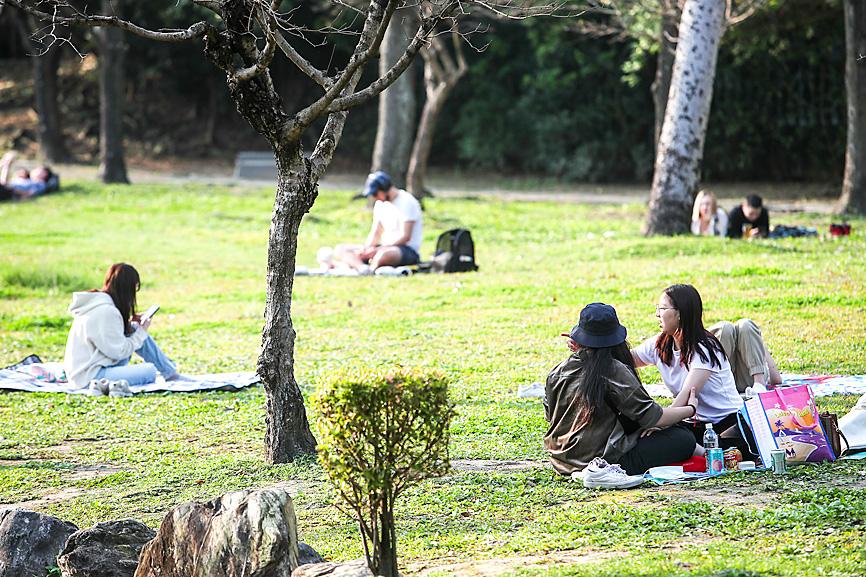Spending more time in the sun might help people who have been having trouble sleeping during the COVID-19 pandemic, a doctor said.
People who work from home and those who look at screens for long periods receive less sunlight and more blue light emitted by electronic devices, which can disrupt the body’s biological clock and affect sleep quality, said Lee Pei-lin (李佩玲), director of the sleep disorder center at National Taiwan University Hospital.
The hypothalamus regulates the circadian rhythm by adjusting physiological functions according to changes in lighting from day to night, Lee said, adding that adjusting work and rest periods according to sunlight might relieve insomnia symptoms.

Photo: CNA
The Health Promotion Administration in May released its latest Nutrition and Health Survey, which collected 7,541 responses from 2017 to 2020.
Respondents older than 19 slept an average of 7.5 hours on weekdays and 8.1 hours over weekends, up by six minutes and 18 minutes respectively from the previous survey, which was conducted from 2013 to 2016.
However, doctors said that sleeping longer does not mean sleeping better, and the time people spend in the sun has a direct influence on the cycle and quality of their sleep.
People aged 16 to 18 slept the least among all age brackets, with almost half of them sleeping less than seven hours on weekdays, the survey found.
About one-third of men aged 19 to 44 slept less than seven hours on weekdays, the national average, and 11 percent of them slept less than six hours on weekdays, it said, adding that both figures were lower in women.
Shan Jia-chi (單家祁), a physician at Cathay General Hospital’s department of psychiatry, on Sunday said that each person has different sleep needs, which are related to the interaction between genetic heritage and environmental factors.
Five hours of sleep might be enough for some people, but others might need eight hours of sleep, Shan said, adding that people aged 16 to 18 might sleep less due to school demands.
Insomnia has been observed in many people with COVID-19, along with other symptoms such as brain fog, coughing and tiredness, he said.
It is difficult to identify the exact cause of insomnia, but some people develop the condition after contracting COVID-19, he said.
Some people who used sleeping pills before contracting COVID-19 have said the pills became less effective afterward, he added.

The Ministry of Education (MOE) is to launch a new program to encourage international students to stay in Taiwan and explore job opportunities here after graduation, Deputy Minister of Education Yeh Ping-cheng (葉丙成) said on Friday. The government would provide full scholarships for international students to further their studies for two years in Taiwan, so those who want to pursue a master’s degree can consider applying for the program, he said. The fields included are science, technology, engineering, mathematics, semiconductors and finance, Yeh added. The program, called “Intense 2+2,” would also assist international students who completed the two years of further studies in

Former president Tsai Ing-wen (蔡英文) departed for Europe on Friday night, with planned stops in Lithuania and Denmark. Tsai arrived at Taiwan Taoyuan International Airport on Friday night, but did not speak to reporters before departing. Tsai wrote on social media later that the purpose of the trip was to reaffirm the commitment of Taiwanese to working with democratic allies to promote regional security and stability, upholding freedom and democracy, and defending their homeland. She also expressed hope that through joint efforts, Taiwan and Europe would continue to be partners building up economic resilience on the global stage. The former president was to first

Taiwan will now have four additional national holidays after the Legislative Yuan passed an amendment today, which also made Labor Day a national holiday for all sectors. The Chinese Nationalist Party (KMT) and Taiwan People’s Party (TPP) used their majority in the Legislative Yuan to pass the amendment to the Act on Implementing Memorial Days and State Holidays (紀念日及節日實施辦法), which the parties jointly proposed, in its third and final reading today. The legislature passed the bill to amend the act, which is currently enforced administratively, raising it to the legal level. The new legislation recognizes Confucius’ birthday on Sept. 28, the

MORE NEEDED: Recall drives against legislators in Miaoli’s two districts and Hsinchu’s second district were still a few thousand signatures short of the second-stage threshold Campaigners aiming to recall Chinese Nationalist Party (KMT) legislators yesterday said they expect success in 30 out of 35 districts where drives have passed the second-stage threshold, which would mark a record number of recall votes held at once. Hsinchu County recall campaigners yesterday announced that they reached the second-stage threshold in the recall effort against Legislator Lin Szu-ming (林思銘). A total of 26,414 signatures have been gathered over the past two months, surpassing the 10 percent threshold of 23,287 in Hsinchu County’s second electoral district, chief campaigner Hsieh Ting-ting (謝婷婷) said. “Our target is to gather an additional 1,500 signatures to reach